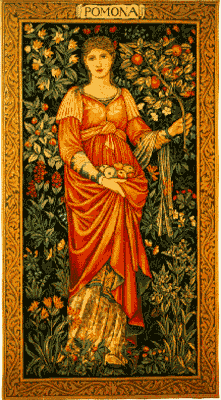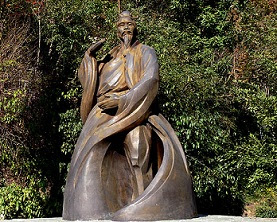Chapter 4
"Tao is like an empty vessel,
yet use will not drain it.
Never needing to be filled,
it is the deep and unfathomable source
of the ten thousand things.
Blunt the sharpness.
Untangle the knots.
Soften the glare.
Settle like dust.
Let your wheels move only along old ruts.
Darkly visible,
it only seems as if it were there.
I know not its name.
It existed before the ten thousand things.
I call it Tao."
- Translated by Kari Hohne, 2009, Chapter 4
Out of this mysterious well flows everything in existence.
Blunting sharp edges, Untangling knots, Softening the glare, It evolves us all and makes the whole world one.
Something is there, hidden and deep!
But I do not know whose child it is.
It came even before God."
- Translated by Brian Browne Walker, 1996, Chapter 4
Deep!
It appears to be Ancestor of all things.
It rounds our angles. It unravels our difficulties. It harmonizes our Light. It brings our atoms into Unity.
Pure!
It appears to be everlasting in principle.
I do not know whose Son It is,
It existed before God was manifest in Form."
- Translated by Isabella Mears, 1916, Chapter 4
"The Tao is like an empty bowl,
Which in being used can never be filled up.
Fathomless, it seems to be the origin of all things.
It blunts all sharp edges,
It unties all tangles,
It harmonizes all lights,
It unites the world into one whole.
Hidden in the deeps,
Yet it seems to exist for ever.
I do not know whose child it is;
It seems to be the common ancestor of all, the father of things."
- Translated by John C. H. Wu, 1961, Chapter 4
道沖而用之或不盈.
淵兮似萬物之宗.
挫其銳.
解其紛.
和其光同其塵.
湛兮似或存.
吾不知誰之子.
象帝之先.- Chinese characters, Chapter 4, Tao Te Ching
dao chang er yong zhi huo bu ying.
yuan xi si wan wu zhi zong.
cuo qi rui.
jie qi fen.
he qi guang tong qi chen.
zhan xi si huo cun.
wu bu zhi shui zhi zi.
xiang di zhi xian. - Pinyin Romanization, Chapter 4, Daodejing
"Existence, by nothing bred,
Breeds everything.
Parent of the universe,
It smoothes rough edges,
Unties hard knots,
Tempers the sharp sun,
Lays blowing dust,
Its image in the wellspring never fails.
But how was it conceived?--this image
Of no other sire."
- Translated by Witter Bynner, 1944, Chapter 4
"Tao is empty, used yet never filled.
It is deep, like the forefather of all things.
It dulls sharpness, and sorts tangles,
Blends with the light, becoming one with the dust.
So serene, as if it hardly existed.
I do not know whose son it is.
It seems to have preceded God."
- Translated by Paul J. Lin, Chapter 4
"El Tao es como un jarrón
que el uso nunca llena.
Es iqual que un abismo,
origen de todas las cosas del mundo.
El embota cualquier filo,
El desmadeja cualquier ovillo,
El fusiona todas las cuces,
El unifica todos los polvos.
El parece muy frofundo,
parece durar siempre.
Higo de un no sé qué,
debe de ser el antepasado de los dioses."
- Translated by Alba, 1998, Tao Te Ching, Capítulo 4
"The subtle Way of the universe appears to lack strength,
yet its power is inexhaustible.
Fathomless, it could be the origin of all things.
It has no sharpness,
yet it rounds off all sharp edges.
It has no form,
yet it unties all tangles.
It has no glare,
yet it merges all lights.
It harmonizes all things and unites them as one integral whole.
It seems so obscure,
yet it is the Ultimate Clarity.
Whose offspring it is can never be known.
It is that which existed before any divinity."
- Translated by Hua-Ching Ni, 1995, Chapter 4
"Tao is an empty vessel;
it is used but never exhausted.
It is the fathomless source
of the ten thousand beings!
It blunts the sharp
and untangles the knots.
It softens the glare
and unites with the dust of the world.
It is tranquil and serene
and endures forever.
I don't know form where it comes
yet it is the ancestor of all."
- Translated by Solala Towler, 2016, Chapter 4
"Tao is a container
Though used again and again
It is never full
Profound! As though the ancestor of all things
Rounding the points
Untying the knots
Softening the glare
Unifying the dust
Tranquil! Although having a life of its own
I do not know whose child it is
It appears to have preceded the primordial ruler"
- Translated by Dan G. Reid, 2016, Chapter 4
"The Tao is like an empty container:
it can never be emptied and can never be filled.
Infinitely deep, it is the source of all things.
It dulls the sharp, unties the knotted,
shades the lighted, and unites all of creation with dust.
It is hidden but always present.
I don't know who gave birth to it.
It is older than the concept of God."
- Translated by John H. McDonald, 1996, Chapter 4
A typical webpage created by Mike Garofalo for each one of the 81 Chapters (Verses, Sections) of the Tao Te Ching (Daodejing) by Lao Tzu (Laozi) includes 25 different English language translations or interpolations for that Chapter, 5 Spanish language translations for that Chapter, the Chinese characters for that Chapter, the Wade-Giles and Hanyu Pinyin transliterations (Romanization) of the Mandarin Chinese words for that Chapter, and 2 German and 1 French translation of that Chapter. Each webpage for each one of the 81 Chapters of the Tao Te Ching includes extensive indexing by key words, phrases, and terms for that Chapter in English, Spanish, and the Wade-Giles Romanization. Each webpage on a Chapter of the Daodejing includes recommended reading in books and websites, a detailed bibliography, some commentary, research leads, translation sources, a Google Translate drop down menu, and other resources for that Chapter. These are hypertext documents, and available online under Creative Commons 4.
Chapter 4, Tao Te Ching by Lao Tzu. Compiled and indexed by Mike Garofalo.
Chapter and Thematic Index (Concordance) to the Tao Te Ching by Lao Tzu
English Language Daodejing Translators' Source Index
Spanish Language Daodejing Translators' Source Index
Ripening Peaches: Taoist Studies and Practices
Taoism: A Selected Reading List
An Old Philosopher's Notebooks
How to Live a Good Life: Advice from Wise Persons












